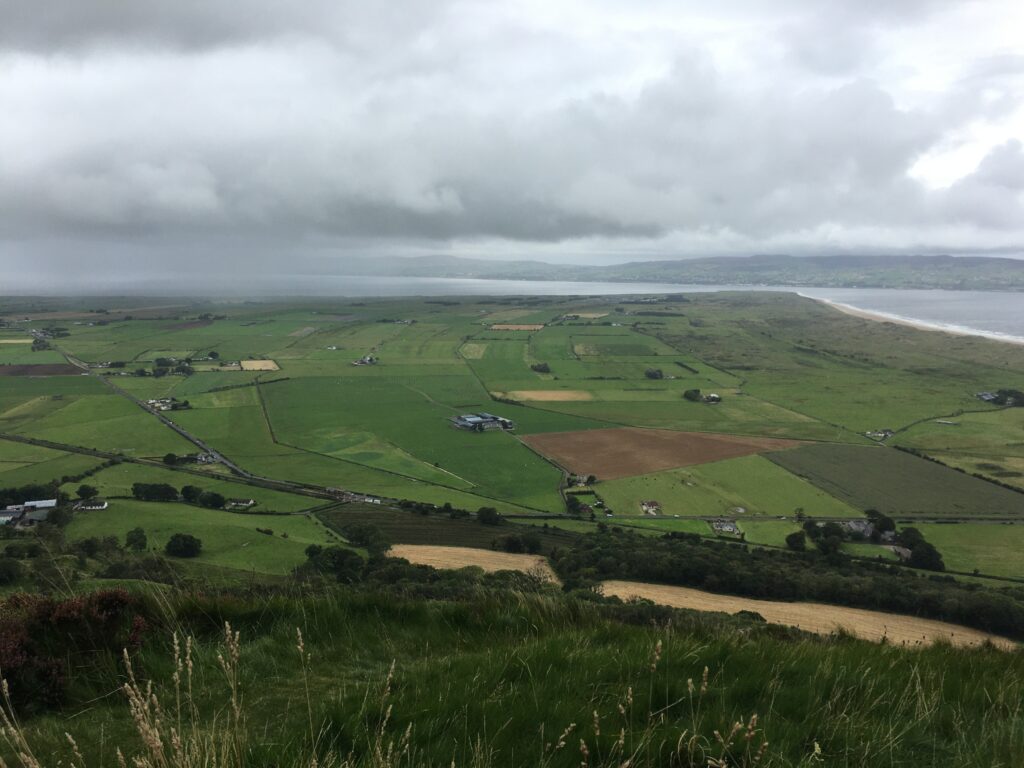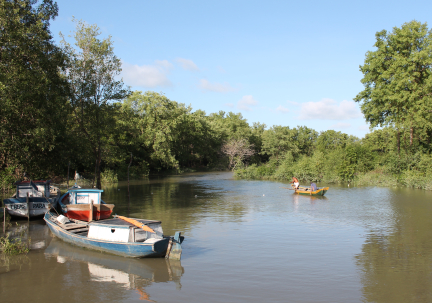When Borders Float: Marine Governance Beyond Lines on Maps
by Rebecca Borges (Pompeu Fabra University) and Jonas Healy (University of Oldenburg/Helmholtz Institute for Functional Marine Biodiversity)
Governance fights to keep up with the tides
Lough Foyle is a water body at the border between Northern Ireland (UK) and Ireland. At its low tide, emerging oyster trestles occupy waters that have sparked decades of diplomatic deadlock. The Amazon coast in Brazil only stretches across two states and dozens of towns. There, crab fishers navigate mangrove channels which have sustained generations, knowing every creek and seasonal rhythm. Yet the boundaries of marine protected areas follow town lines rather than ecological and social geographies meaningful to crabs and people.


These distant sites reveal how boundaries pervade social-ecological systems, everyday life and conservation interests, pointing to a fundamental challenge in how we govern coastal spaces: our dependence on rigid boundaries in fluid worlds.
From land to sea
Marine governance strategies begin with maps and lines—protected areas here, fishing zones there. It’s orderly but contradicts how coastal ecosystems function. Water, however, does not respect boundaries. Crabs migrate across administrative lines. Tides follow lunar, not political cycles. Yet we squeeze dynamic systems into rigid land-based governance boxes.
This creates real challenges. In Lough Foyle, border disputes complicate oyster farming regulation, raising concerns about ecosystem sustainability while farmers navigate uncertain regulatory territory without clear frameworks. In Brazil’s Amazon, mismatched ecological and administrative boundaries create coordination problems. Traditional fishing communities face participation restrictions on traditional fishing areas when villages and fishing areas fall under different jurisdictions—legitimacy of fishing rights questioned not by conservation needs, but by arbitrary lines on maps.
Beyond the Map: What our research has shown
We interviewed fishers, managers, and NGO workers across these coastal areas. Beyond governance challenges, we glimpsed alternative ways of organizing people-coast relationships.
In the Brazilian mangroves, we heard stories that challenged our assumptions about conflict and boundaries. “This is not the conflict factor,” one researcher with years of experience told us, pointing to the invisible line between protected areas. The problem lies somewhere else. When resources are scarce and agreements break down, conflicts emerge. When agreements hold and resources are managed well, people collaborate seamlessly. Both scenarios are independent of whether people are from the same or different towns.
In Lough Foyle, we found similar complexities. Yes, the disputed location of the border creates regulatory paralysis for oyster farming, but it has also enabled creative cross-border cooperation in other sectors. The Loughs Agency, a cross-border agency, represents an attempt at shared sovereignty—two countries agreeing to manage fisheries as a single ecosystem rather than carved-up national fragments.
Lessons from the Dry-and-Wet World
These experiences reinforce the need for “wet ontologies” (as originally described by Kimberley Peters and Philip Steinberg and built on by other scholars). This means thinking from water rather than land, flow rather than fixity. Instead of “who owns this space?” we ask “how do we foster relationships within ecosystems?” Borderland loughs and mangroves offer abundant lessons in this direction.
It is not about abolishing boundaries entirely nor about pursuing the establishment of borders. Brazilian fishing communities use sophisticated territorial systems sustainably, albeit incipient social conflicts. The problem is not territory itself, but mismatches between land-based logics and ecological realities, between administrative convenience and social-ecological relations.
What would marine governance look like if we started from the water inlandwards rather than the land waterwards?
First, it would be relational rather than territorial. Rather than focusing on authority, it would build cross-boundary collaboration platforms for shared stewardship. Brazilian fishers ask for forums connecting protected areas around shared mangrove systems. Irish/Northern Irish groups emphasized strengthening cross-border connections over precise demarcation.
Second, it would be adaptive, not fixed. Coastal ecosystems change constantly—tides, seasonal migrations, sea-level shifts. Governance must respond to ecological rhythms, not bureaucratic calendars.
Third, it would center coastal communities’ knowledge rather than consulting them after decisions. The most detailed ecosystem knowledge resides with local users and other residents who have developed generational relationships with these environments.
The Politics of Fluid Governance
Fluid ontologies for coastal social-ecological systems represent fundamentally different ways of organizing relationships beyond territorial Nation-State systems. The territorial approach, emphasizing exclusive sovereignty over bounded spaces, struggles with governing flows and ecosystems that exceed boundaries.
Climate change is making these limitations more apparent every day. Sea level rise will redraw coastlines regardless of what our maps say. Marine species are migrating poleward as oceans warm, creating new geographies of abundance and scarcity. Coastal cities face flooding that doesn’t respect administrative boundaries.
Our experiences in Brazil and Northern Ireland/Ireland reveal post-territorial possibilities, suggesting that just coastal governance requires abandoning obsessions with rigid lines on maps and embracing the fluid, relational character of marine worlds.
Toward Liquid Governance?
Rigid governance, for all its limitations, provides clarity about authority. Fluid governance requires constant negotiation and relationship-building—messier, more time-consuming, harder to map. But the costs of territorial rigidity in coastal-marine spaces are challenging for both ecosystems and communities. The choice is not between perfect fluid and imperfect territorial governance; rather, it requires evolving institutions to match coastal realities or watching both collapse under outdated forms.
The tides are rising, literally and figuratively. The question is whether our governance systems will learn to swim, or keep drowning while drawing lines on maps as the water rises around them.
Acknowledgements and Disclaimer
This research was conducted as part of a comparative study on transboundary coastal governance, supported by the Helmholtz Foundation via HIFMB/AWI. We also thank the interviewees and the field work support in Brazil and Ireland/Northern Ireland.
The full academic paper is forthcoming. Please keep an eye on the POLLEN newsletter for the release of the manuscript.